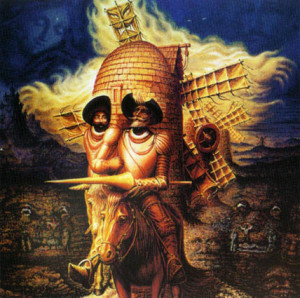The end, the end, the end. Goodbye and Vale!
For those of us who finished the book, we are very ready to have finished this book. To throw it to the ground and stomp, relist it on Amazon, or even place it on our shelves because it marks a long journey and great triumph. I will say I do feel more complete now. My knowledge of the literary canon now has the traditional start. This book ends in a very interesting way that takes us back to the beginning. My partner asked me how I felt about it. I shrugged my shoulders and and said it was good.
She shook her head. It wasn’t the greatest novel? I said perhaps, it certainly isn’t a great novel on it’s own. The book would never have been published today, yesterday, or anywhere in the past 116 years. Although, I will say it is a post modern novel, and accomplished modernism before there was anything to revolt.
It ends as anti-climatic as the novel itself. Nothing spectacular happens other than Don Quixote returning to sanity. His friends disappointed. It was his grief that killed him, his failure, and the restriction put upon his defeat against the Knight of the Moons (AKA Bachelor Carrasco, the very knight who tried to get him to return home disguised as the knight of the mirrors.) This time with a bigger horse and faster gallop, defeats Don Quixote and sentences him to a year of laying down his arms and living a simple life. The bachelor’s goal is to force him home long enough for his sanity to return.
There are adventures and occurrences on their journey back. Sancho raises someone from the dead. he disenchants Dulcinea by fake whipping himself, and Don Quixote writes his will. All hilarious and amusing things.
However for me, there is one point to make about the text I would like to go over, then I will explain why it is a good book and not a great book.
At the end of the prologue before we get into the Quixote, Cervantes ends his authorial note by saying, “Vale,” which means farewell in Latin. The last word of the book is also Vale. If Cide Hamete is the author of Quixote, it seems to suggest by this last word that Cervantes is revealing himself to be the true author of the Quixote. No where else is the word used besides these two places. It’s wink, to the end the beginning of literature.
As far as it being a great novel, I cannot say it is so. On its own it doesn’t produce any feeling as modern works of literature are supposed to do. As you read Catcher in the Rye you feel exactly what this Holden is feeling. When you read Faulkner you can feel the self-hatred of the characters. There is a specificity in modern literature that penetrates and pulls the heart strings. The only thing I think I was moved to do was to get water and laugh occasionally. This book draws no real emotion because the plot lines or sentiment of action are ever followed through. There is seemingly no real struggle for the characters. Things just seem to work out.
However it is a great book as it is situated in history. Because in 1605 and 1615 Cervantes was able to write every little aspect of the human condition. Everything that Shakespeare did in all his plays, Cervantes did in Quixote. It may not have been as entertaining, but its in there. Everything that has been written since then, indeed as Bloom says, follows in its sublime wake.
Thank you for reading.
Vale
